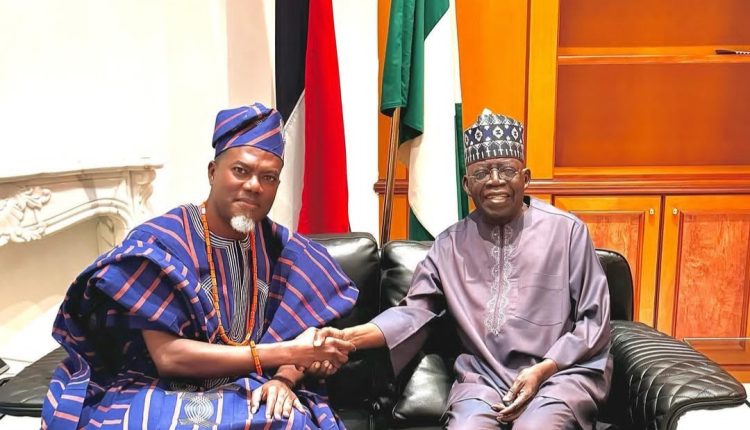Reno Omokri’s Outing with Tinubu: A Masterclass in Sycophancy and Self-Interest
By Matthew Eloyi
In the latest display of what can only be described as sycophancy cloaked as patriotism, Reno Omokri, a former aide to ex-President Goodluck Jonathan and staunch supporter of the Peoples Democratic Party (PDP), has shocked many with his recent praise of President Bola Tinubu’s administration.
Omokri, who is better known for his controversial takes on social media, took to X (formerly Twitter) to shower accolades on the President after paying an Independence Day visit to the Presidential Villa. However, upon closer inspection, it is clear that Omokri’s sudden enthusiasm for Tinubu’s leadership is little more than a self-serving attempt to curry favour and secure relevance within Nigeria’s political elite.
Omokri’s recent praise for Tinubu represents a stark departure from his previous role as a vocal critic of the ruling All Progressives Congress (APC) and its policies. In a video posted shortly after his visit to Tinubu, Omokri likened Nigeria’s current economic trajectory to that of Vietnam, citing supposed improvements in security, trade, and economic reforms. His willingness to suddenly switch sides and lavish praise on a leader he had previously opposed raises serious questions about the sincerity of his commentary.
To begin with, Omokri’s glowing endorsement of Tinubu’s government is deeply problematic when viewed against the backdrop of Nigeria’s ongoing socio-economic crisis. While he points to the killings of bandit leaders and a reduction in Nigeria’s terrorism index as evidence of security improvements, Nigerians are still grappling with widespread insecurity. From kidnappings to banditry and communal clashes, insecurity continues to cripple large parts of the country. Yet, Omokri conveniently glosses over these realities, choosing instead to align himself with the President in a way that feels less like patriotism and more like a calculated move for personal gain.
Even more concerning is Omokri’s embrace of the removal of the petrol subsidy—one of Tinubu’s most controversial economic policies. While it is true that some opposition leaders had also proposed subsidy removal during the 2023 elections, Omokri’s enthusiastic support of this painful policy shift rings hollow. Millions of Nigerians are currently reeling from the sharp increase in fuel prices, which has led to a corresponding rise in the cost of living. For a man who has long positioned himself as a voice of the common people, Omokri’s newfound stance seems less about the people and more about ingratiating himself with those in power.
Omokri’s comparison of Nigeria’s economic situation to that of Vietnam is equally baffling. While Vietnam’s economy has indeed experienced rapid industrial growth, Omokri’s claims that Nigeria is following a similar path are wildly optimistic, if not outright misleading. The average Nigerian is yet to see any tangible benefits from the so-called “economic reforms” Omokri applauds. Manufacturing remains limited, inflation is high, and unemployment continues to plague the youth. If Omokri believes that the hardship many Nigerians face is akin to the success story of Vietnam, one must question whether he truly understands the depth of Nigeria’s economic challenges—or if he is simply trying to create a narrative that flatters the Tinubu administration.
What becomes increasingly clear is that Omokri’s praise of Tinubu has little to do with the realities on the ground. Instead, his recent behaviour appears to be part of a larger, self-serving effort to reposition himself within Nigeria’s political circles. By publicly aligning himself with the President, Omokri is likely hoping to secure recognition, and perhaps even a coveted appointment, in a government that he had previously derided. It is difficult to see his recent actions as anything other than an attempt to ingratiate himself with the very power structures he once claimed to oppose.
This is not the first time Nigeria has witnessed political figures make abrupt, self-interested pivots. The country’s political landscape is rife with individuals who shift allegiances in search of personal advancement, often at the expense of their credibility. Unfortunately, Omokri’s recent outing seems to fall squarely into this category. His transformation from critic to supporter is not born out of genuine conviction but rather a desire for personal relevance.
In the end, Omokri’s actions serve as a reminder that in the world of Nigerian politics, principles can often take a backseat to personal ambition. His Independence Day visit to the Presidential Villa, coupled with his sycophantic praise of Tinubu’s policies, is a blatant example of how some public figures are willing to trade integrity for the possibility of recognition and reward. Nigerians deserve leaders and commentators who prioritise the well-being of the people over personal gain—unfortunately, Omokri’s recent behaviour suggests he is not one of them.

